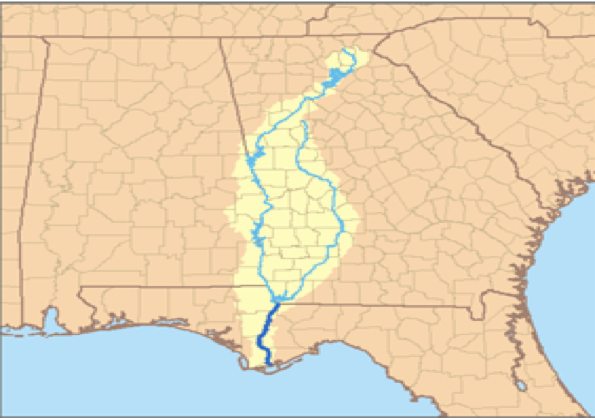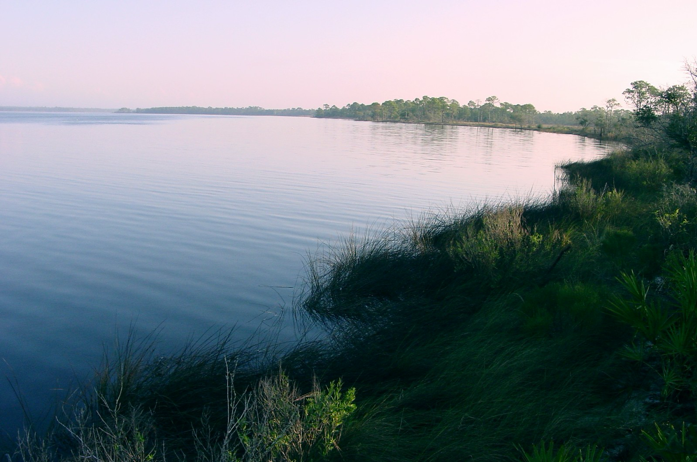The U.S. Supreme Court decided two weeks ago to schedule oral arguments on Feb. 22 to hear the dispute over the allocation of water in the Apalachicola-Chattahoochee-Flint river system.
The river basin begins in the mountains of northern Georgia with Lake Lanier; the water drains much of the metro Atlanta area, southwest Georgia, and part of Alabama before flowing into Apalachicola Bay in the Gulf of Mexico.
Lake Lanier, as the main source of water from the basin, supplies water for about 70% of the metro Atlanta area and Georgia’s $13.8 billion agriculture industry.

Map of the Apalachicola-Chattahoochee-Flint river system running through Florida, Alabama, and Georgia. Unmodified photo by Pfly used under a Creative Commons License. (https://bit.ly/3tuXd54)
Florida and Georgia have fought for decades over who has the right to use the water from the river system. In 2013, Florida filed a lawsuit contending that Georgia was using too much water from the basin, depleting the Apalachicola water system and threatening the oyster industry in Apalachicola Bay.
Georgia says it’s been a responsible administrator of water resources that both states share and pushes back against Florida’s new water distribution proposal.
Florida wants to limit the amount of water that Georgia uses so more of it can flow downstream to Florida’s agriculture and fishing industries that have been struggling economically.
The complicated water dispute has appeared more than once in the U.S. Supreme and district courts over the eight years of litigation. In January 2018, Supreme Court justices heard the first round of oral arguments and conducted evidentiary procedure; the case, however, was remanded to a lower court to rule on a water dispute technicality.
The Supreme Court appointed Federal Judge Paul Kelly, a judge who specializes in legal environmental disputes, to review the evidence and make a recommendation for further review.
Judge Kelly subsequently recommended rejecting Florida’s request to limit Georgia’s water usage.
“Because Florida has proved neither that Georgia’s consumption is inequitable nor that the benefits of a decree would substantially outweigh the potential harms….I do not decide whether reasonable modifications could be made to the Corps’ Manual,” Kelly wrote in his recommendation.
Kelly’s recommendation did not end the dispute. The Supreme Court justices must now decide if they choose to accept Kelly’s recommendation when they convene the next round of oral arguments and make a decision in the next judicial term.
Georgia viewed Kelly’s decision as a major victory while prominent Florida figures have thrown their support behind the lawsuit. Gwen Graham, former congresswoman and gubernatorial candidate, has expressed interest in filing legal briefs with four other Florida counties in support of Apalachicola Bay and the residents that rely on the water supply.
“I feel very confident what we are doing is right,” Graham said. “We’re just trying to find some way to respect the water flow issues to help Apalachicola River and Bay.”
Droughts and environmental disasters have significantly impacted the community in Apalachicola Bay.
The bustling oyster industry, which at one point supplied more than 90% of Florida’s oysters, has experienced devastating wildfires, the coronavirus pandemic, and long droughts and overharvesting, which local and state officials blame Georgia for causing.
In December, the Florida Fish and Wildlife Conservation Commission approved a five-year suspension of oyster harvesting in Apalachicola Bay with the hopes of reviving the industry.
Franklin County Commission Chairman Ricky Jones is concerned about the impact this will have on the local community as the county has now become a single-industry community since the seafood harvesting has been put on hold.
The suspension went into effect Feb. 1, long before the Supreme Court will hear oral arguments that will impact the future of the Apalachicola community.
Regardless of how the Supreme Court decides, any decision will impact the flow of water to different communities that need it to survive.
Featured image: Apalachicola River Basin. Unmodified public domain photo by Diane Delaney. (https://bit.ly/3cqaCoT)
Check out other recent articles from the Florida Political Review here.





